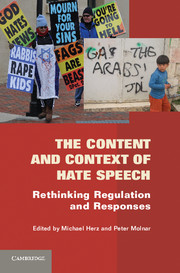Book contents
- Frontmatter
- Contents
- Contributors
- Foreword: Hate Speech and the Coming Death of the International Standard before It Was Born (Complaints of a Watchdog)
- Foreword: Hate Speech and Common Sense
- Acknowledgments
- Introduction
- Part I Overviews
- 1 Interview with Robert Post
- 2 Is There a Case for Banning Hate Speech?
- 3 Hate Speech
- 4 Interview with Kenan Malik
- 5 Hate Speech and the Demos
- 6 On American Hate Speech Law
- Part II Refinements and Distinctions
- Part III Equality and Fear
- Part IV International Law
- Index
- References
5 - Hate Speech and the Demos
Published online by Cambridge University Press: 05 June 2012
- Frontmatter
- Contents
- Contributors
- Foreword: Hate Speech and the Coming Death of the International Standard before It Was Born (Complaints of a Watchdog)
- Foreword: Hate Speech and Common Sense
- Acknowledgments
- Introduction
- Part I Overviews
- 1 Interview with Robert Post
- 2 Is There a Case for Banning Hate Speech?
- 3 Hate Speech
- 4 Interview with Kenan Malik
- 5 Hate Speech and the Demos
- 6 On American Hate Speech Law
- Part II Refinements and Distinctions
- Part III Equality and Fear
- Part IV International Law
- Index
- References
Summary
It is sometimes said that the statist and aristocratic traditions of Europerender its political institutions less democratic than those of the UnitedStates. Richard Posner writes of “the less democratic cast ofEuropean politics, as a result of which elite opinion is more likely tooverride public opinion than it is in the United States.” If that istrue, then there are obvious ways in which it figures into debates over thewisdom of hate-speech regulation. The standard European argument in favor ofsuch regulation may easily be characterized as antidemocratic: Restrictionson hate speech protect unpopular minority groups from democracy run amok.The Nazi example states the paradigm case, even if the paradigm no longerdescribes the usual targets of such regulation. By contrast, the Americanargument against hate-speech regulation is typically framed in democraticterms: Informed deliberation requires that all sides have an opportunity tobe heard, with the most able policies emerging through a form ofintellectual competition. Or, more interestingly, full participation in ademocratic community requires that self-expression not be limited to whatothers have deemed orthodox.
There is another way, however, in which the relatively democratic characterof American politics influences – or rather, shouldinfluence – the debate over regulation of offensive speech.Scholars of U.S. constitutional law have increasingly recognized thatconstitutional argument must not simply appeal to democratic norms but mustalso attend to democratic conditions. Constitutional law is not fashionedthrough Socratic argument among scholars and judges, nor does it followmerely from the currents of elite opinion, but it results rather from adialogue between political institutions – including theSupreme Court – and social and political movements, against abackground of often exogenous cultural conditions. Thus, we shouldunderstand Brown v. Board of Education not as an epiphanyinspired by the force of Earl Warren's charisma or Felix Frankfurter'sintellect but as a piece of a movement strategy led by the NationalAssociation for the Advancement of Colored People (NAACP) and enabled, inpart, by antipathy toward fascism and Stalin's Soviet Union. Changes in U.S.sex-equality law in the 1970s can be tied directly to the sexual revolutionof the 1960s and the political forces behind the Equal Rights Amendment.
Information
- Type
- Chapter
- Information
- The Content and Context of Hate SpeechRethinking Regulation and Responses, pp. 92 - 115Publisher: Cambridge University PressPrint publication year: 2012
References
Accessibility standard: Unknown
Why this information is here
This section outlines the accessibility features of this content - including support for screen readers, full keyboard navigation and high-contrast display options. This may not be relevant for you.Accessibility Information
- 4
- Cited by
